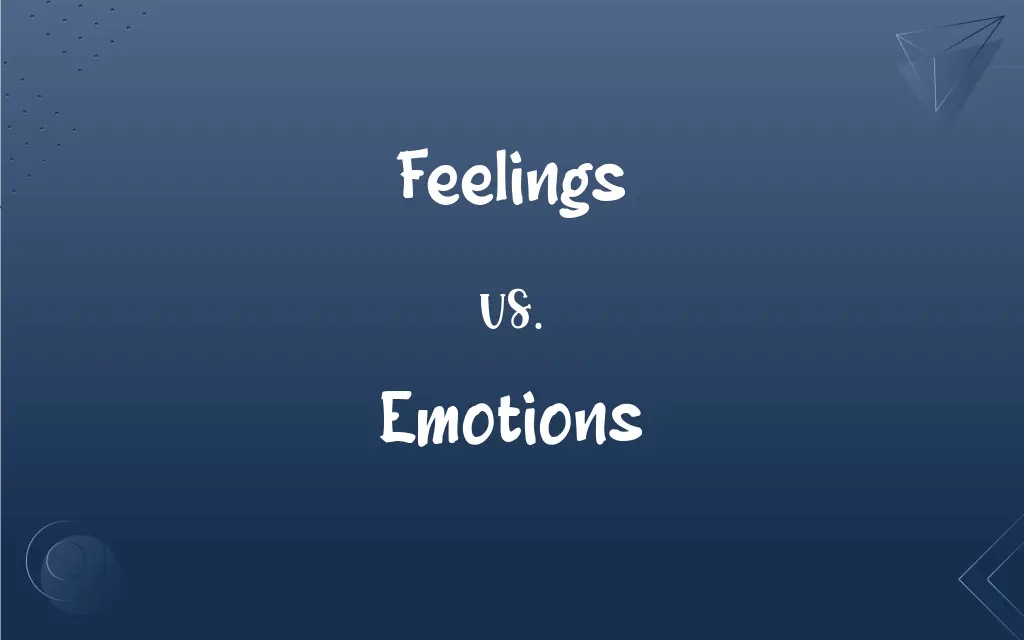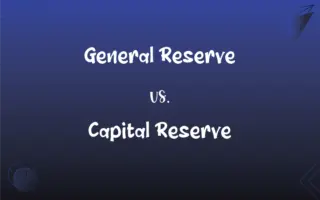Feelings vs. Emotions: What's the Difference?
Edited by Aimie Carlson || By Harlon Moss || Published on January 17, 2024
Feelings are personal interpretations and reactions to emotions, while emotions are complex psychological states triggered by thoughts or experiences.

Key Differences
Emotions are complex psychological states that arise spontaneously, often as a response to external stimuli, and are usually accompanied by physical changes. Feelings are the subjective experience and personal interpretations of these emotions, shaped by individual beliefs and memories.
Emotions are universal and shared across cultures, such as happiness, anger, or fear, and are often recognizable through facial expressions and body language. In contrast, feelings are deeply personal, varying significantly from person to person, as they are influenced by individual experiences and perceptions.
The intensity and duration can differ between emotions and feelings. Emotions are typically short-lived and intense, like a burst of anger or a moment of surprise. Feelings, however, can be enduring, lingering long after the initial emotional response has subsided, such as a prolonged sense of sadness or contentment.
Emotions can be studied objectively through physiological responses and brain activity, while feelings are subjective and challenging to measure scientifically, as they are deeply intertwined with personal thoughts and reflections.
Understanding one's emotions is crucial for emotional intelligence, which involves recognizing and managing emotions in oneself and others. Feelings, being more nuanced, require a deeper level of self-awareness and introspection to understand and articulate.
ADVERTISEMENT
Comparison Chart
Nature
Personal interpretations of emotions
Complex psychological states
Universality
Subjective and individual
Universal and shared across cultures
Duration
Can be long-lasting
Typically short-lived and intense
Measurement
Subjective and hard to measure
Can be objectively studied
Relation to Stimuli
Based on personal experiences and memories
Often triggered by external stimuli
ADVERTISEMENT
Feelings and Emotions Definitions
Feelings
Personal responses to emotions.
Her feelings of joy were overwhelming after hearing the good news.
Emotions
Affective states of consciousness.
She experienced a strong emotion of joy at the concert.
Feelings
A state of consciousness reflecting emotional conditions.
His feelings of remorse were evident in his apology.
Emotions
Complex psychological states involving physiological changes.
His sudden emotion of fear was triggered by the loud noise.
Feelings
The conscious perception of emotional reactions.
Her feelings of unease persisted long after the movie ended.
Emotions
Physiological and psychological responses to experiences.
Her emotions were a mix of excitement and anxiety about the new job.
Feelings
Personal interpretations of sensations and emotions.
She described her feelings of warmth and comfort in the cozy room.
Emotions
Universal human experiences like happiness or sadness.
The movie evoked deep emotions of sadness and empathy.
Feelings
Subjective experiences of emotional states.
He struggled to articulate his complex feelings of nostalgia.
Emotions
Involuntary responses to stimuli.
His emotion of anger flared up during the argument.
Feelings
The sense of touch
Lost feeling in a toe.
Emotions
A mental state that arises spontaneously rather than through conscious effort and is often accompanied by physiological changes; a feeling
The emotions of joy, sorrow, and anger.
Feelings
A sensation experienced through this sense
Enjoyed the feeling of rain on my face.
Emotions
Such mental states or the qualities that are associated with them, especially in contrast to reason
A decision based on emotion rather than logic.
Emotions
Plural of emotion
FAQs
Are feelings the same as emotions?
No, feelings are personal interpretations of emotions.
Can feelings last longer than emotions?
Yes, feelings can be enduring, lasting longer than the initial emotion.
Can emotions be measured?
Yes, emotions can be measured through physiological responses.
What triggers emotions?
Emotions can be triggered by thoughts, experiences, or external stimuli.
Can someone control their feelings?
While emotions can be spontaneous, feelings can be managed through reflection and understanding.
Are feelings universal?
No, feelings are subjective and vary from person to person.
Are emotions always conscious?
No, emotions can occur subconsciously.
Are feelings unique to each individual?
Yes, feelings are deeply personal and influenced by individual experiences.
Do emotions have physical expressions?
Yes, emotions often have physical expressions like facial expressions or body language.
Can emotions be the same in different cultures?
Yes, basic emotions are generally universal across cultures.
Is anger an emotion or a feeling?
Anger is an emotion, and how one experiences and interprets it is a feeling.
Are feelings influenced by memories?
Yes, feelings are often influenced by personal memories and experiences.
Can feelings be contradictory?
Yes, individuals can experience conflicting feelings simultaneously.
Is it possible to have emotions without feelings?
Emotions can exist without being consciously perceived as feelings.
Is it normal to experience a wide range of feelings?
Yes, experiencing a wide range of feelings is a normal part of human experience.
Do emotions influence decision-making?
Yes, emotions can significantly influence one's decisions.
Can understanding emotions improve mental health?
Yes, understanding and managing emotions is key to mental well-being.
Do feelings reflect one's personality?
Yes, feelings can reflect aspects of an individual's personality and worldview.
Can emotions be positive and negative?
Yes, emotions can be categorized as positive, negative, or neutral.
Are emotions linked to survival?
Yes, many emotions have roots in survival mechanisms.
About Author
Written by
Harlon MossHarlon is a seasoned quality moderator and accomplished content writer for Difference Wiki. An alumnus of the prestigious University of California, he earned his degree in Computer Science. Leveraging his academic background, Harlon brings a meticulous and informed perspective to his work, ensuring content accuracy and excellence.
Edited by
Aimie CarlsonAimie Carlson, holding a master's degree in English literature, is a fervent English language enthusiast. She lends her writing talents to Difference Wiki, a prominent website that specializes in comparisons, offering readers insightful analyses that both captivate and inform.







































































